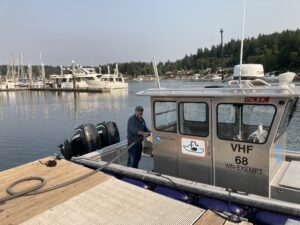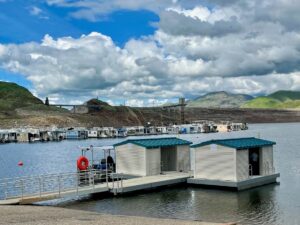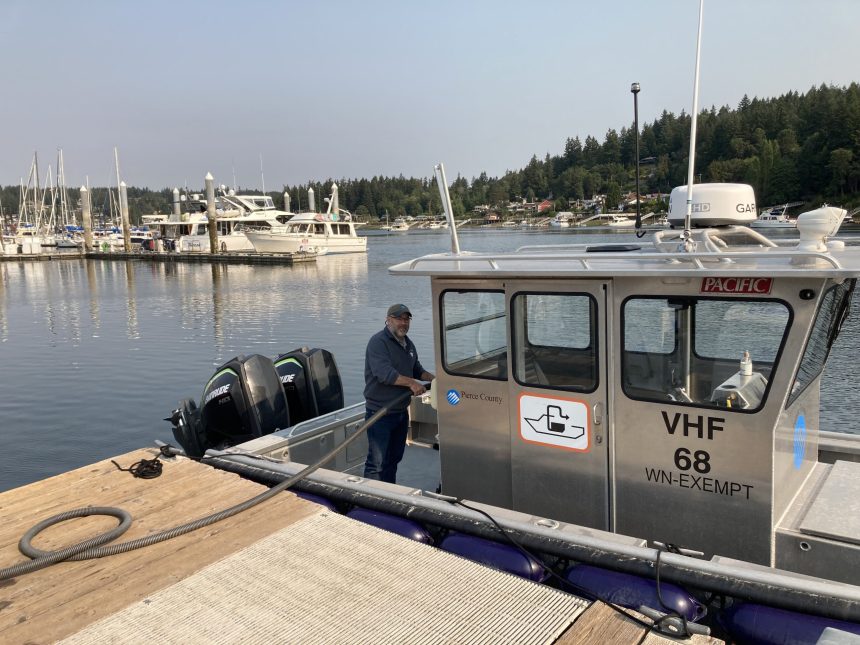By Craig Springer, USFWS
It is about what is not in the water that is the success of the Clean Vessel Act. Established by Congress in 1992, CVA provides for state and territorial boating agencies to set up remote restrooms and sewage handling facilities to conveniently off-load human waste from watercraft into collection stations. The waste ultimately goes into local sewage treatment facilities, just as happens when you flush a toilet at home.

Funding for CVA starts with excise taxes paid by the manufacturers of fishing tackle and on motorboat fuel via the Sportfish Restoration Act. Boating agencies apply for CVA grant monies which are awarded annually by the U.S. Fish and Wildlife Service’s Office of Conservation Investment. In 2024, $14.6 million were awarded to Alabama, Arizona, California, Connecticut, Florida, Guam, Iowa, Maine, Massachusetts, Nevada, New Hampshire, New Jersey, New York, North Carolina, Ohio, Oklahoma, Texas, Washington and Wisconsin to set up new, renovate, or maintain waste collection facilities on public waterways, adding to existing successes.
The Kansas Department of Wildlife, Parks and Tourism recently replaced a dilapidated pump-out station on the 15,000-acre Milford Lake at Milford State Park. The lake feeds Milford Hatchery (also funded by Sportfish Restoration dollars) that produces millions of walleye, largemouth bass, channel catfish and blue catfish for Kansas anglers. Milford Lake is a destination for boaters and anglers near Kansas City. The dilapidated station at Walnut Grove boat ramp served its purpose for 17 years, and now begins anew.
The Oklahoma Department of Wildlife Conservation manages Broken Bow Lake for its excellent black bass and crappie fishing. The 22-mile-long lake is a weekend—or longer—getaway for anglers and boaters from neighboring Texas and Arkansas, and Oklahoma residents, too. A pump-out at Beavers Bend State Park helps ensure a high-quality fishery and pleasant destination for all.
The California State Parks, Division of Boating and Waterways made ample use of CVA dollars at popular fishing and boating destinations, installing pump-outs at Riverbank Marina in Sacramento, and Morro Bay Yacht Club in Morro Bay. New restrooms float at Castaic Lake, Lake Amador, Pine Flat Lake, and Lake Kaweah, two of which include mobile pump units for servicing.
A mobile pump-out vessel plies the waters of South Puget Sound thanks to a CVA grant to Washington State Parks, and other entities, that puts waste it is proper place. The small boat belies its big influence on water quality and health, hauling out 10,000 gallons of waste, operating between Memorial Day and Labor Day.
The Pennsylvania Fish and Boat Commission upgraded a pump-out station at the All-Seasons Marina along the Delaware River, ensuring greater reliability and efficiency in disposing sewage. The leviathan Atlantic sturgeon, an 800-pound fish native to the watershed, is a beneficiary of clean water.

North Myrtle Beach is a high-traffic destination synonymous with motorboating. The South Carolina Department of Natural Resources assisted the Cricket Cove Marina and Harbourgate Marina Club through CVA, purchasing mobile pump-out vessels to service the two facilities. A pup-out station at Harbour Town Yacht Basin at Hilton Head pumped out 23,640 gallons of waste in 2023.
Some 48 million people, nearly 16 percent of Americans, participated in motorized boating in 2021, according to the 2022 National Survey of Fishing, Hunting, and Wildlife-Associated Recreation. So, what CVA keeps out of public waterways is a public good; CVA supports the good health of people and incalculably improves the quality of life and the lifestyles of those who find solace, renewal, and local food in the out-of-doors—hunting, trapping, fishing, boating, or quiet contemplation of nature. Cleaner water improves the health and sustainability of shellfish beds, fisheries, and wildlife and their habitats. Cleaner waterways benefit everyone.

